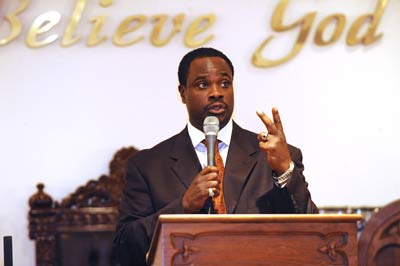Community News
Community Activism Works, Voter Education a Must

Civics
By David Mark Greaves
Rev. W. Taharka Robinson is the founder of the Brooklyn Anti-Violence Coalition (BAVC), a community activist, and a political strategist. Taharka Robinson has worked tirelessly for two decades in and around the Bedford Stuyvesant community. He led the ten-year effort to bring to justice to the family of Chanel Petro-Nixon, a sixteen-year-old honor student who was strangled to death and left in a garbage bag on Kingston Avenue in 2006. In 2016, Veron Primus was charged and indicted with the murder of Chanel Petro-Nixon.
Taharka Robinson and Bruce Green, BAVC President, led the successful effort to insist that TD Bank close in observance of Rev. Dr. Martin Luther King Jr’s birthday. After a year of negotiations with TD Bank, the bank closed fourteen hundred locations from Maine to Florida in observance of Dr. King’s holiday.
Under Taharka’s leadership, BAVC also held demonstrations in front of Rent-A-Center on Fulton Street and other locations objecting to their usurious interest rates and was instrumental in a several year quest to enact the strictest rent-to-own laws in the country. In 2010, legislation was submitted by then-Senator Eric Adams and signed into law by then Governor David Patterson.
A student of history, Taharka takes Brooklyn youth and adults on a yearly civil rights tour to Civil Rights museums and sites, including the 16th Street Baptist Church in Birmingham, Alabama where four little girls were killed in a bombing, the Birmingham Civil Rights Museum, the state capital of Montgomery, the Dexter Avenue Baptist Church where Rev. Martin Luther King, Jr. pastored, the Voting Rights Museum in Selma, did the obligatory walk across the Edmund Pettus Bridge, and toured the Equal Justice Initiative in Montgomery, as well as visit other sites. He is also active in Brooklyn political campaigns. It is because of this history that we go to Taharka for guidance on how the city works.
“The City Council and its leadership should be reflective of the diversity of the city. We’ve never had an African-American as Speaker of the New York City Council,” said Taharka Robinson. Members of the Hispanic, Italian, and Jewish, communities have held the position as speaker but never has the largest minority population held the seat and in fact, Brooklyn itself, with the largest Black population, “has never been represented at that level of office in the city council and the last three speakers have been from Manhattan.”
It is the Speaker of the City Council who gets to appoint committee Chairs and council members to the committees on their agenda. “I want you to understand what I’m telling you; these committees are very influential. The government affairs committee, the contracts committee, education, housing, small business committee, Land Use, and Public Safety. The Speaker is responsible for appointing the chairs to these committees and has a lot of say in a lot of things, affecting every aspect of life in the city.”
You would think that Brooklyn being the most populous borough would have the weight of that population behind them. Apparently, that’s a naïve thought. Queens, Manhattan and the Bronx got together a couple of years ago and put their votes together to elect Cory Johnson as Speaker of the City Council. The Speaker is voted on by the members of the council.
“Let me explain this to you. Once the Municipal Elections are over…” he went on to describe the process by which the Speaker of City Council is elected, beginning with the mayor and the chairs of the county organizations and the mayor says to the chairs of the democratic county organization “We have to select an individual that we all feel comfortable working with.”
When people say they don’t understand why we don’t have goods and services, it starts at the city level. Let’s go back three years ago when we were dealing with the Third-Party-Transfer Program.
Taharka had demonstrated in front of the offices of NYC councilman Ben Kallos, who was the one who put in the legislation that “property could be taken and put in the Third-Party Transfer program for a thousand dollars. What area does he represent? The upper eastside. The Third-Party Transfer program isn’t happening up there.
“The point I’m trying to make to you is this: If a councilmember has a piece of legislation they want to pass, they go to the chair of the committee handling it and say they have legislation to submit to the committee and “Some people don’t even look at the Bills,” as long as they’re getting support for their own legislation. “That’s what they call ‘A working relationship.’”
Politics is an interesting business,” Taharka mused, and it certainly is not like making widgets. It is based on and held together by relationships between voters looking for services from their representatives, and the representatives working with Party players and peers, to deliver them.


